
More than half of the world’s population, some four billion people, are participating in elections in 40 countries this year. Haggie Partners will be regularly tracking the key battleground issues in two of these contests: the US Presidential election on 7 November and the UK General Election which took place on 4 July.
July 2024
Edition 5
Labour’s election win and Britain’s ‘national mission’ for growth
The Labour Party has returned to power in Britain after winning a historic landslide election victory. “The work of change begins immediately” said Keir Starmer upon arrival at Downing Street after accepting the King’s invitation to form a new government.
Labour won a 170-seat majority in the House of Commons as up and down the country it won seats from the Conservatives and Scottish Nationalists, though this record haul was on the basis of only 34% support.
This was not so much a story of Labour victory, however, as it was of Tory humiliation. Defeated Conservative prime minister Rishi Sunak resigned on 5 July having led his party to the worst-ever defeat in its 190-year history. The party that had been in power for the past 14 years was swept away with many commentators and pollsters arguing that Britain’s flatlining economy, prolonged underinvestment in public services and a range of political controversies during the Johnson era in particular were to blame.
Immediately after the new prime minister’s arrival in Downing Street he set about appointing his Cabinet. Angela Rayner was the first to be announced as deputy prime minister, but Rachel Reeves as chancellor is of far greater political and economic significance. David Lammy was appointed foreign secretary.
Reeves is one of the most powerful figures in Sir Keir’s inner team along with Pat McFadden, a highly influential but low-key former minister under Tony Blair and Gordon Brown. Now chancellor of the duchy of Lancaster, McFadden has been deeply involved for months in preparing to govern. Sue Gray, another key player, is a former civil servant and now the prime minister’s chief of staff, who has been in regular contact with Cabinet secretary Sir Simon Case, since the turn of the year. After the Labour leader’s missions had been fine-tuned and turned into policies, they were then made into ‘implementation plans’ for government.
Reeves made history by becoming the UK’s first female chancellor of the exchequer, bringing with her a promise of change in economic and financial policymaking at the highest level, and committed Labour to a national mission in support of growth. “Where governments have been unwilling to take the difficult decisions to deliver growth – or have waited too long to act – I will deliver. It is now a national mission. There is no time to waste.”
She wasted no time in issuing a damning assessment of the state of the UK’s finances. The new chancellor of the exchequer said she was inheriting a depleted economy from the Conservatives that would create a ‘challenge’ for the new Labour government. “There’s not a huge amount of money there,” Reeves told the BBC on 6 July. “I know the scale of the challenge I inherit.”
This Treasury will play its full part in a new era of industrial strategy, working hand in glove with business, to make sure Britain is truly open to business once again.
Rachel Reeves, chancellor of the exchequer, 4 July
Reeves said she would lean on the private sector to cover the shortfall. “Private-sector investment is the lifeblood of a successful economy. We need to unlock private-sector investment” she said.
Reeves has articulated a clear objective during her years as shadow chancellor to drive economic growth by reducing reliance on public debt and instead encourage private investment. Key players in the investment world expressed their support. Paul Plewman, who heads Macquarie’s operations in Europe, the Middle East, and Africa, praised Labour’s approach as providing “a strong platform for a positive partnership with the private sector.” Blackstone’s head of European real estate, James Seppala, highlighted the UK as its primary market in Europe, noting the incoming government’s supportive stance towards inward investment as a crucial factor.
Reeves is expected to pursue an economic agenda influenced by – among others – Janet Yellen, US secretary of the treasury, whose policies are said to have encouraged job creation and a manufacturing investment boom. Yellen’s ‘modern supply-side economics’ aims to bolster economic growth by raising productivity while reducing inequality. In practice, this has meant giving companies incentives – subsidies and tax cuts – to invest in the US and generate jobs, particularly in emerging green sectors.
Reeves is also influenced by the Harvard economist Dani Rodrik, who calls for ‘productivism’, a partnership between governments and businesses to create more productive jobs throughout an economy.
The chancellor is anticipated to resist tax rises in her first budget expected in September and will set a tight one-year spending envelope for departments. The big question for Reeves is what happens in 2025? The Conservatives always claimed Labour would increase taxation and if that growth doesn’t come, Reeves may have no choice.
Former chancellor Jeremy Hunt paid tribute: “Keir Starmer and Rachel Reeves are decent people and committed public servants who have changed the Labour Party for the better. Whatever our policy differences, we all now need them to succeed.”
Main opposition parties
Rishi Sunak has apologised to the nation following the Conservative Party’s general election defeat – the worst in its parliamentary history. Accepting responsibility for the result, Sunak said he heard voters’ anger at his government.
“To the country I would like to say first and foremost I am sorry,” he said. “I have given this job my all but you have sent a clear message that the government of the UK must change, and yours is the judgement that matters.”
The Conservatives won 24% of the vote, and 121 seats, down 251 seats on 2019’s election results. Former Prime Minister Liz Truss – whose brief period in office led to a slump in support from the public – lost her Southwest Norfolk seat to Labour by 630 votes. She is among dozens of senior Tories who lost their seats, including defence secretary Grant Shapps, Commons leader Penny Mordaunt, and former leader of the house Sir Jacob Rees-Mogg.
Rishi Sunak will remain the Conservative party leader, subject to a timeframe being set by the influential backbench 1922 Committee, which will meet this week to decide who sits on its executive. It will then work out a timetable for a contest.
With Jeremy Hunt, the former chancellor, having ruled himself out as leader over the weekend of July 7/8, the leadership contest is likely to be between Kemi Badenoch, Priti Patel, and Suella Braverman as well as former home secretary James Cleverly and former security minister Tom Tugendhat.
Nigel Farage’s Reform party won more than 14.3% of the vote, 5 seats, and 4m votes. Farage said in his acceptance speech that this was achieved without a significant party infrastructure and with only four weeks of real campaigning, after his decision to throw his hat into the ring in early June and suggested the party’s potential with years of campaigning ahead. The election was the first step in a “mass movement across the country” that would “change politics for ever.”
As many as two-thirds of the seats the Tories lost were the result of Reform UK splitting the Conservative-leaning vote, according to the Daily Mail on Friday 5. In more than 170 of the 251 constituencies lost by the Conservatives, the Reform vote was greater than the margin of the Tories’ defeat.
Liberal Democrat leader Sir Ed Davey hailed a “record-breaking” night after his party won 72 seats. That represents a big increase on its performance in the 2019 election, when it returned to Parliament with just 11 MPs.
The Liberal Democrats took swathes of the affluent south that had been considered Tory heartlands, including seats in Surrey and Hampshire. Several Tory ministers were unseated by Lib Dem challengers, including education secretary Gillian Keegan, justice secretary Alex Chalk, culture secretary Lucy Frazer and science secretary Michelle Donelan. The party had hoped to beat Jeremy Hunt in Godalming and Ash, but the former chancellor held on to his seat by a majority of just 891.
The SNP lost 39 seats winning in only 9 constituencies across Scotland.
After the election: Reasons to be cheerful
Grant Lewis and Neville Hill of Hybrid Economics, whose mission is to help firms chart their way through economic and climate challenges towards a resilient, sustainable future, give their view to Let’s Vote on what comes next.
As the polls predicted, the Labour Party has won its majority in the UK General Election and Keir Starmer has become Prime Minister. But expectations for what this new government will be able to change are low.
The challenges the incoming government will face are well documented. In the past 15 years the UK economy has barely grown. The public finances are in dire shape, with a large deficit and massive government debt even as the tax burden stands at its highest since World War 2. Public services, meanwhile, are in desperate need of money. A series of crises – the NHS, strikes, the potential collapse of universities or water companies – all loom on the horizon as Starmer gets his feet under the desk in Number 10.
A grim inheritance indeed, and one that’s driving the low expectations for a Starmer government. But past performance is not always the best guide to the future. Ten years ago, Ireland and Greece were in absolute crisis. Today they are amongst the strongest economic performers in Europe. The UK’s dire economic performance was partly down to bad luck – the financial crisis and the pandemic – but was mainly the result of terrible policy – austerity and Brexit – and political turmoil.
There are several reasons to think that a Labour government could usher in a period of better economic performance.
First, the political turbulence we’ve lived with since 2016 – Brexit, five Prime Ministers, six Chancellors, the notorious ‘mini-budget’ – now ends! Starmer has a large majority, enormous authority over his party, and the prospect of at least two terms in office. Businesses will see – and expect – stability in politics and policy. That will make them more willing to invest and hire. But it also means that the government will be able to push through tough policies that should boost growth in the longer term.
While the Labour Party has limited its room for manoeuvre by promising not to raise Income Tax, National Insurance, and VAT rates, we expect the budget this autumn to deliver some additional money for the UK’s beleaguered public services by raising taxes on some or all of capital gains, inheritances, and pensions. It may also broaden the tax ‘base’, by extending National Insurance to investment income.
Planning reforms should ease the UK’s housing crisis – allowing more people to move to where the most productive jobs are – and allow the industries of the future to invest in gigafactories, data centres, and film studios.
Labour’s energy policy should allow for a fast build-out of wind and solar electricity generating capacity, accelerating the path to net zero but also creating the long-term prospects of cheaper, more stable energy supplies that will boost competitiveness.
And a Labour government could improve the economic relationship between the UK and the EU. Their manifesto only proposes minor changes to that, but public opinion is moving sharply in favour of a closer relationship. Rejoining the customs union and single market would be the most transformative step to boost growth in the long run. At a minimum we expect steps to be made in that direction in Labour’s first term.
So, although it’s easy to be pessimistic about the UK at the back end of 14 years of economic failure, we are much more cheerful. In the short run the economy will enjoy a tailwind from an end to the turbulent politics and poor economic policies of recent years. And in the longer-term Labour’s planning, energy and EU policies should underwrite stronger economic growth. Investors may find that UK assets offer great long-term value.

There are several reasons to think that a Labour government could usher in a period of better economic performance.
Insurance industry reaction
The insurance industry was quick to react to the election result. Lloyd’s chair Bruce Carnegie-Brown expects things to be more stable under the new leadership. Carnegie-Brown was quoted as saying: “Lloyd’s looks forward to partnering with the new UK government to generate growth and to build resilience into our economy”.
ABI director general Hannah Gurga stated: “We look forward to working with the Government to deliver on our mutual priorities. Our industry shares many areas of common interest with the new government, including an ambition to drive growth and competitiveness, boost household financial resilience against risks, and tackle climate change”.
The British Insurance Brokers’ Association (BIBA) welcomed Labour’s commitment to introducing a Regulatory Innovation Office while it also called on the government to introduce secondary legislation in relation to the Leasehold Reform Act. It also highlighted SME business resilience, particularly in regard to cyber and flood risk and progressing the reform of the apprenticeship levy and access to EU insurance clients.
Bruno Gardner, head of climate change and nature at Phoenix Group, stated that an incoming government aiming to catalyse investment in net zero at regional and local levels would be highly advantageous to the UK. “Phoenix Group stands ready to play its part in accelerating the net zero transition across the country,” Gardner said.
Key battleground issues
Geo-politics
Cyber
Climate
Economy
Risk
Geo-politics

French voters turned out in large numbers for the second round of the parliamentary elections on 7 July to deny the National Front (RN) its expected victory. No party will be able to command a majority government.
If the nationalist, Eurosceptic RN had secured a majority, it would have ushered in France’s first far-right government since WW2 and sent shockwaves through the European Union at a time when populist parties are strengthening support across the continent. In fact, they were pushed into third place. The left-wing coalition will have 182 seats, Macron’s Ensemble party 168, and the RN 143.
Macron called the snap election after his party was trounced by the RN in June’s European parliamentary elections; a move apparently aimed at wrong-footing his rivals in a legislative election. Macron’s gamble was to position a centrist government against opposition movements from the left and far right. Marine Le Pen said on the 7 July that Macron’s position was now “untenable”.
NATO’s celebration of its 75th anniversary at a summit in Washington between 9-11 July risks being overshadowed not only by Russia’s ongoing war in Ukraine but by uncertainty over the future of the organisation itself.
One of the enduring elements of Western strategy through NATO has been to preserve American dominance in the West and to counter the rise of potentially dominant countries in Asia, China in particular. However, the future of US-European relations is emerging as one of the most significant political issues that affect geo-politics.
Europe may find after November’s US election that US emphasis is likely to be bold in Asia and more restrained in Europe. We can safely anticipate that President Biden, Ursula Von der Leyen, President of the EU and Keir Starmer and will resolutely defend NATO and its achievements in the run up to the summit.
Cyber

Former UK Prime Minister Tony Blair has given an interview marking Keir Starmer’s election as prime minister in which he stated, “The spread of the application of AI by the private sector and its encouragement by appropriate government policy is the only answer to Britain’s productivity challenge and, over time, it can turbocharge growth.
“Over two terms of government, we estimate the savings could run into tens of billions of pounds allowing us to get growth back to the levels it was in the early part of the century,” he said. “This 21st-century technological revolution is the real-world fact that will change everything.” Blair added, “The question is whether we have the imagination to harness it. The companies and countries that do will prosper, and those that don’t will fall behind.”
Meanwhile, in something of a groundbreaking moment for the UK General Election, the first-ever Artificial Intelligence candidate, AI Steve, secured only 179 votes. Steve Endacott, an independent candidate from the southern seaside town of Brighton, decided to run in the election due to his frustration with traditional politics. His company, Neural Voice, created an AI alter ego, “AI Steve,” which appeared on the ballot papers. AI Steve was created in a way that would allow it to engage in discussions with locals on various issues, including LGBTQ rights, housing, bin collection, and immigration, all in real-time. AI then proposed policy ideas and solicited suggestions from the community. The Electoral Commission confirmed that if AI Steve were to win, it would be Endacott himself who served rather than the AI version of himself.
OpenAI’s ChatGPT and Microsoft’s Copilot, two of the most popular generative AI chatbots, spread a false claim about the broadcast of the presidential debate, NBC reported. The chatbots replicated a conservative writer’s assertion that debate broadcaster CNN would air the event with a ‘1-2-minute delay’ as opposed to the ‘standard 7-second delay’ highlighting the potential election risks the tools pose with a rising tide of misinformation and conspiracy theories online.
Reuters reported on 5 July that Google has said it will simplify how advertisers disclose election ads using digitally altered content to depict actual or realistic-looking people or events. The announcement comes as the US presidential race draws nearer and GenAI’s rapid growth raises concerns about its possible misuse.
Climate

Ed Miliband has been confirmed as the UK’s new secretary of state for energy security and net zero. Miliband, the former leader of the Labour Party, has held the shadow energy brief since April 2020 when Keir Starmer became Labour leader.
Miliband made a bold pre-election pledge to turn the country into a ‘clean energy superpower’ as part of an incoming government, saying immediate action would also be taken in the first weeks of a Labour government to overturn an onshore wind ban in England and relax planning rules.
In the US, “Ignoring climate change is deadly and dangerous and irresponsible”, President Biden said on 5 July. “These climate-fuelled extreme weather events don’t just affect peoples’ lives. They also cost money, they hurt the economy and they have a significant negative psychological effect on people.”
Biden’s remarks follow a spate of weather events extending beyond the heat waves in the United States. Hurricane Beryl, a Category 5 hurricane, smashed records for its intensity so early in the season. The President said the United States was hit with $90 billion in damage from weather events last year and attacked his predecessor on his green record and played up his own work on climate change. Biden touted the passage during his administration of the Inflation Reduction Act — the “most extensive climate change legislation in history” and heralded the new American Climate Corps that puts young people into climate and renewable energy jobs.
Trump slammed Biden’s environmental approach as a ‘green new scam,’ deriding “money that’s being thrown out the window.” Mr Trump said he wants “absolutely immaculate clean water and I want absolutely clean air.” He went on “During my four years, I had the best environmental numbers ever, and my top environmental people gave me that statistic just before I walked on the stage.”
With possible implications across the investment sector, the Financial Times reported on 2 July that BlackRock funds with specific climate change mandates will vote differently on shareholder proposals than the remainder of the firms $10.5tn holdings, in its latest effort to deal with the political controversy over decarbonisation. All BlackRock funds consider climate as a risk factor affecting financial performance but those funds that follow its new ‘climate & decarbonisation stewardship guidelines’ will consider whether companies are actively trying to limit the average global temperature rise to 1.5C above pre-industrial levels, identified as a threshold in the Paris Agreement between almost 200 countries.
The new stewardship policy is BlackRock’s attempt to balance the demands of European and US clients who want it to push for decarbonisation, with US laws that require fund managers to prioritise financial returns.
Economy

The US inflation figures for June, expected later this week, are expected to fall to just 3.1% in a boost to American markets and raise analyst anticipation of an interest cut before the November poll.
Fed Chair Jerome Powell said on 4 July: “We just want to understand that the levels that we’re seeing are a true reading of what is actually happening with underlying inflation. We want to become more confident and frankly, because the US economy is strong…we have the ability to take our time”. Interest rates are currently 5.3%, which if the Fed waits to reduce borrowing costs may weaken the economy and risk recession.
In the UK, on 19 June inflation fell to 2% and will be reported on again by the Office for National Statistics on 17 July. British growth figures were a little higher than anticipated at 0.7% said the ONS on 28 June. Growth will be a ‘national mission’ according to the Chancellor Rachel Reeves on 8 July. “With political turmoil out of the way, Britain is once again one of the more stable places to invest”. She is expected to loosen planning red tape that has held back construction, the green industry, housebuilding, and the energy grid.
Reeves is likely to be asked when she’ll give the Office for Budget Responsibility notice of her first Budget. This is normally ten weeks, which would mean around 16 September.
Risk

Voters have migrated to the extremes of politics because of failing belief in democracy and in modern economics, and the trend now faces a ‘classic inflection point’ in the coming US presidential election, according to Rory Stewart, a former UK cabinet minister and now academic at Yale, as he delivered the keynote address at the Risk Live Europe event in London on 18 June.
The Financial Times on 5 July reported that “an industry that over the past two decades has been hoovering up mathematicians to devise new trading strategies is now leaning on political scientists for guidance. Most investors are used to dealing with pockets of instability and conflict, but many say the sheer number of recent shocks – even in traditionally stable democracies – and the long-term nature of conflicts represent a sea change”.
The most obvious way some investment companies have adjusted is by rushing to bring in more geopolitical expertise, either in-house or through outside consultants, says the FT. “Those people are in high demand,” says Seth Bernstein, chief executive of AllianceBernstein. “Every Wall Street firm is bringing around people like that for [investors] to meet . . . there’s a profound realignment happening, and it does spook the hell out of me.”
If President Biden goes…
Democrats head to Chicago for the Democratic National Convention in August where the Democratic choice as Presidential candidate will be endorsed. Should Biden ultimately decline to seek re-election the principal candidates are likely to include:
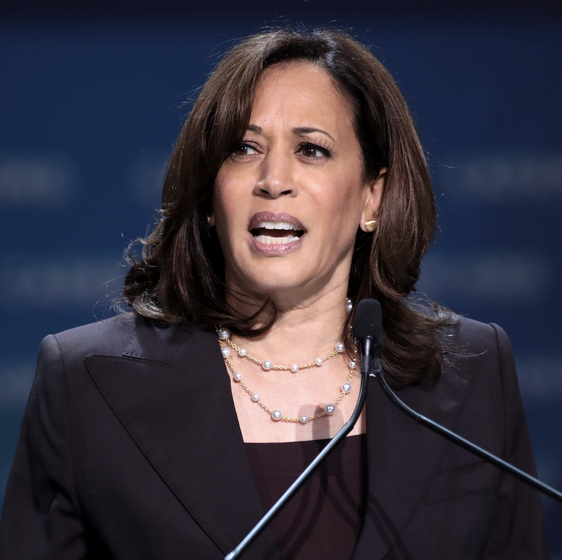
Kamala Harris
The single most likely replacement for Biden is his vice president, Kamala Harris, whose constitutional duties include stepping in if the president is unable to continue serving in office. However, the former California attorney general and US senator does not enjoy widespread public support and is a polarising figure for the right.

Gretchen Whitmer
The Michigan governor is seen as one of the leaders of the moderate wing of the Democratic Party in the post-Biden era. She won re-election in 2022 by a wide margin buoyed by support for reproductive rights and her management of the Covid pandemic, turning Michigan Democratic with relative ease. Whitmer has voiced her concern that the debate performance would make things far more difficult for Biden but reiterated her commitment to him.
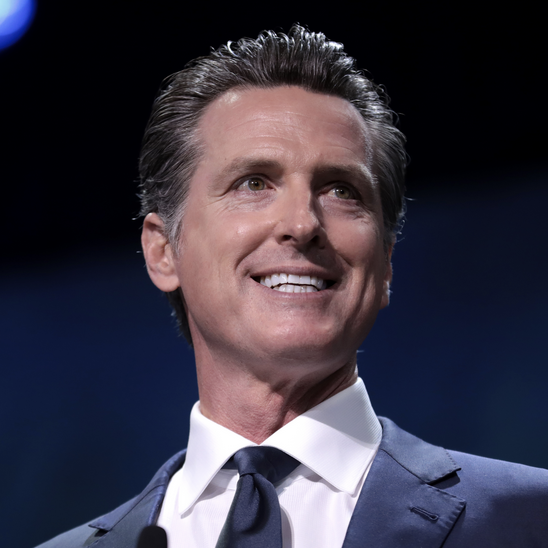
Gavin Newsom
Newsom’s personal wealth and prolific fundraising abilities and his film star good looks place him on the shortlist as Biden’s successor. Newsom is in the middle of a second term as governor of his state, however, as he pledged during his 2022 re-election campaign that he would serve a full four years in office if sent back to the office. Senator Marco Rubio has also pointed to a problem with a possible Harris-Newsom ticket in that both candidates are from California.
Parliament most diverse in history
This parliament will now be the most diverse in British history, in terms of gender and ethnicity. Britain has voted in some 263 female MPs spanning most parties. Labour are the majority of this group (72 per cent) with 190 female MPs, while 29 women make up a quarter of the Tories’ total MPs. Some 45% of elected Liberal Democrats are women (32 out of 71), while three of four Green wins are women. While 16 per cent of Reform’s candidates were women, none of them won seats. A record number of 87 ethnic minority MPs have been elected, up from 66 in 2019, according to analysis by think tank British Future.
Britain has voted in some 263 female MPs spanning most parties.
A record number of 87 ethnic minority MPs have been elected.
Polls
Donald Trump has widened his lead over President Biden by three points. Of more immediate interest, however, is the eighty-six percent of Democrats who said they would vote for Biden in a match up against Trump in November, a Wall Street Journal poll found. That figure was down from the 93% of Democrats who said they would vote for him in February, according to the poll, which had 1,500 registered voters interviewed from 29 June through 2 July. The Wall Street Journal said the margin of error is plus or minus 2.5 percentage points for the full sample.
Biden has however narrowed Trump’s lead in crucial swing states including Arizona, Georgia, Nevada and North Carolina in spite of his debate performance, according to a new poll published on 7 July. In the new Bloomberg poll Trump holds only a three-point lead over Biden in Arizona, Nevada and North Carolina and a one-point lead over Biden in Georgia.
With opinion pollsters in the US looking at the performance of the UK polling industry and possible improvements for November’s election, Jane Frost, chief executive at the Market Research Society, said that she was “pleased to see that the polls were consistent and reporting much more responsible than has happened in the past”.
This was backed by Chris Hopkins, political research director at Savanta, who said that the UK polling industry had performed generally well while Dr Patrick English, director of political analytics at YouGov, said that the final projection in its MRP model correctly projected the Labour landslide and the collapse in the Conservative vote. “There are things in the results that we will need to build into our future work. While we foresaw Labour’s struggles in its safest seats and a potential fragmentation of its voter base coming, our model could have done better at picking up the extent of that”.
9 July 2024 from The Economist
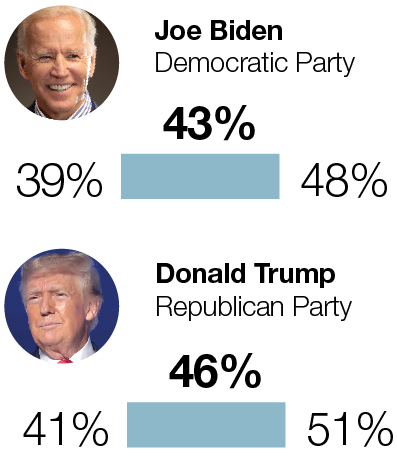
Manifesto watch
Click on the links to read the latest manifesto related information
Social media watch
Social media was hostile to President Biden following his appearance in the US election debate on 27 June. This week social media posts turned to the British General Election, Blair’s enthusiasm for AI, the start of Biden’s fight back and some humorous comments regarding England’s success in the Euro 2024 championships and the election of Starmer as Prime Minister.

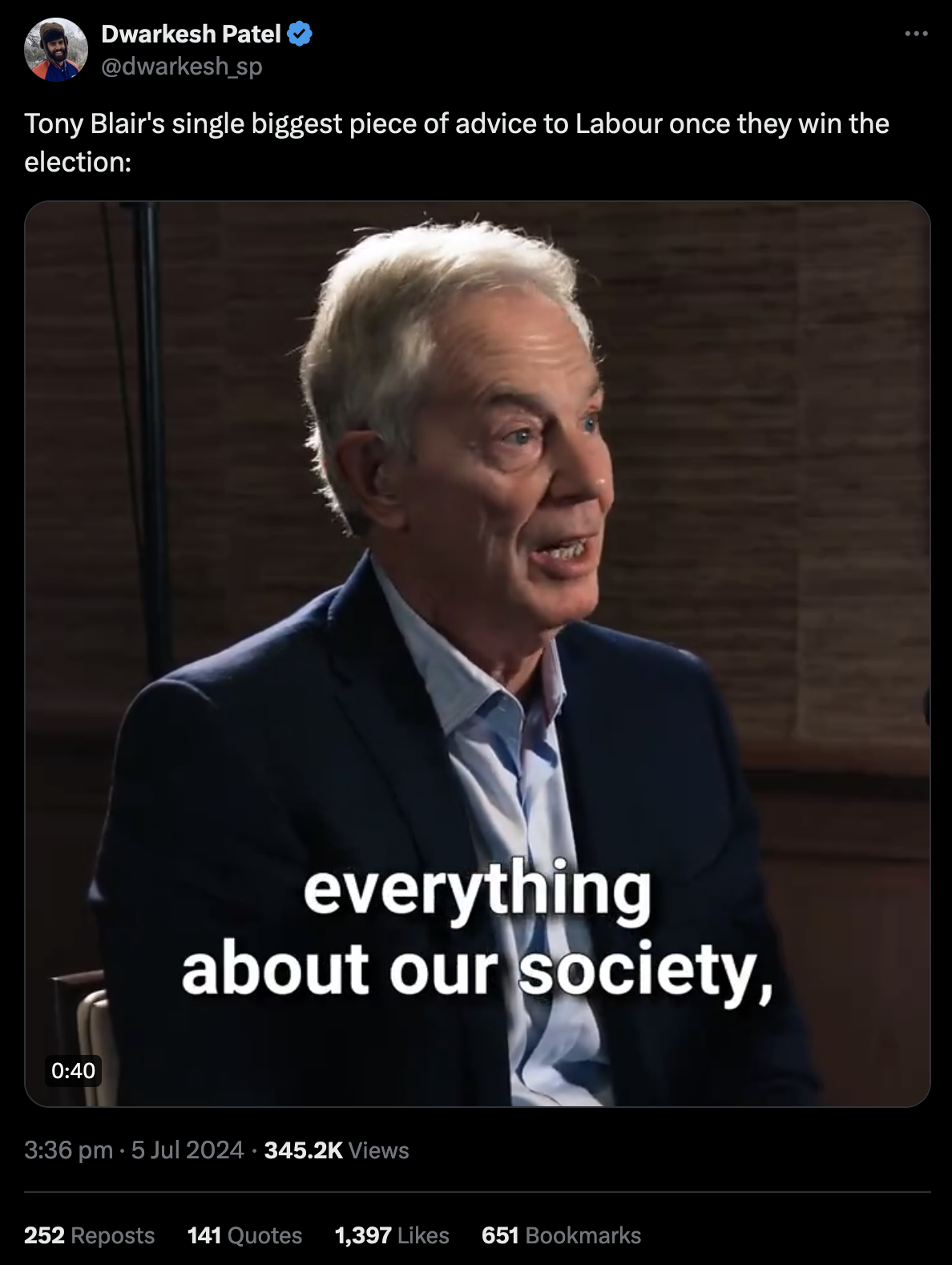
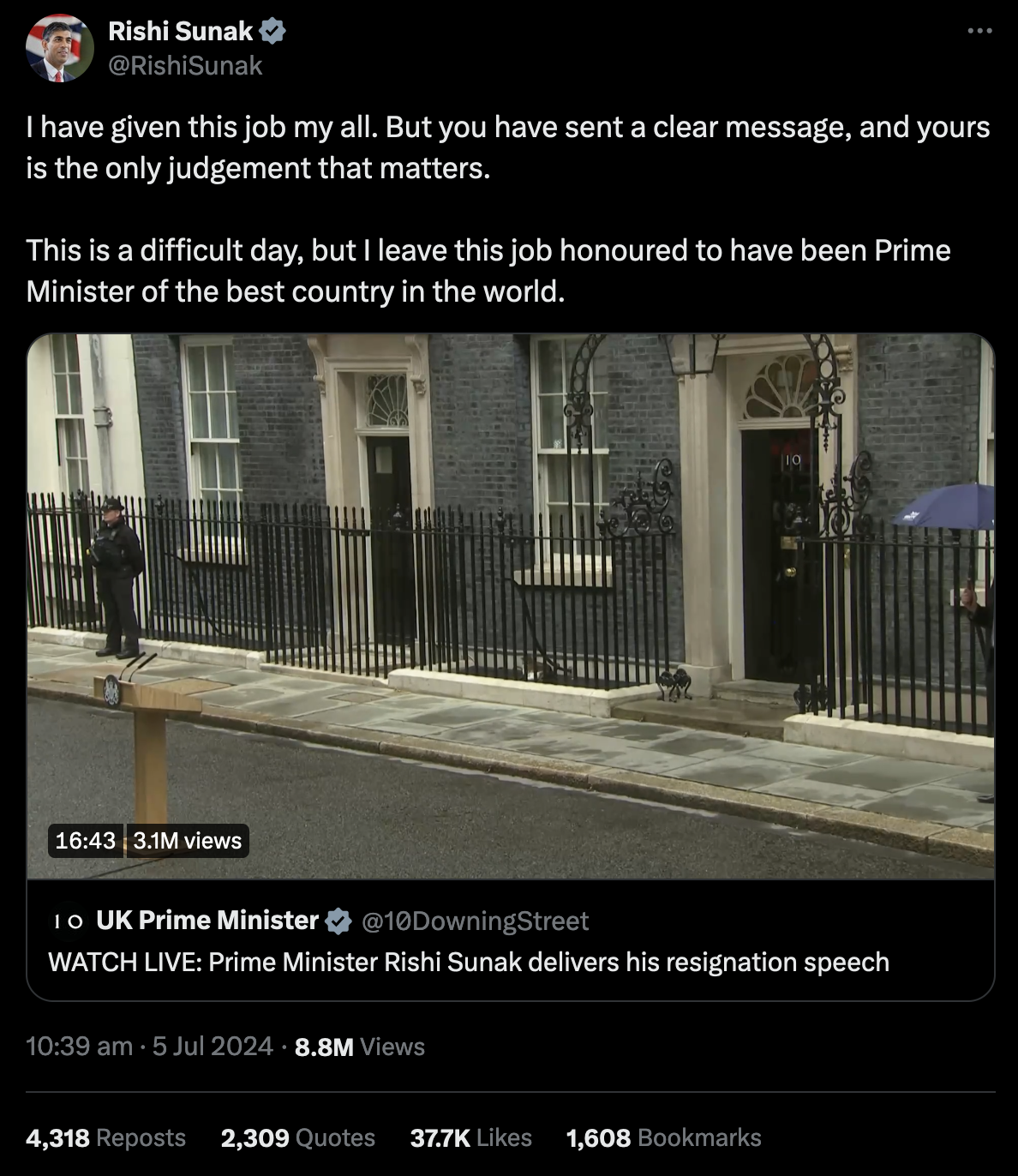


Election campaign watch
15 July: The Republican National Convention
19 August: The Democratic National Convention
10 September: The second Presidential debate
5 November: Election Day
6 January 2025: Results certification
20 January 2025: Inauguration
17 July: The King’s Speech.
September: The new government’s first budget (or fiscal event).
Get in touch
Cressida.Tarver@haggie.co.uk



